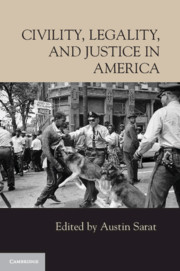4 - Against Civility: A Feminist Perspective
Published online by Cambridge University Press: 05 August 2014
Summary
Judging from the spate of essays, blogs, websites, and conferences devoted to the decline of civility in American society, it would appear that we find ourselves in a dire crisis. Whether this crisis is real or imagined, there is little doubt that it has come to define how we think about the whole problem of public life today. If public opinion surveys are to be believed, the majority of Americans (75 percent) now think that there is indeed a crisis and that it is unprecedented in scope. Joe Wilson’s infamous “You lie!” outburst in the middle of President Obama’s speech was just one more (albeit dramatic) example of our decline into rampant rudeness. For some critics, the crisis points to a kind of domestic version of Samuel Huntington’s “clash of civilizations,” in which all are talking (very loudly) but no one is listening. Indeed, the deafening cacophony of voices, say critics, is the increasingly unbearable price we pay for our otherwise commendable commitment to pluralism. Incivility, in short, is pluralism run amuck.
Rather than affirm that there is a crisis, I want to ask how the very concept of civility is linked to particular normative conceptions of democratic politics. Before turning to the core of my argument, we do well to note that, historically speaking, rude and raucous behavior is hardly new in American political life. As Cornell Clayton has written, venerated political figures such as Thomas Jefferson and John Adams, those “models” of rational political discourse, publicized outright lies and half-truths about their opponents, more or less dragging them through the proverbial journalistic mud. What is more, political arguments in those golden days of reasonable debate often enough ended in deadly duels and fist-fights. “We should resist golden-ageism on the subject of civility and American democracy,” declares Fredrik Logevall. “The halcyon days of political geniality and decorum in the United States never existed, not in the early days of the republic and not in the two-plus centuries that followed.” The point is not that nothing has changed; new forms of media, for example, have altered the ways in which extreme views can be publically voiced and the tone in which they are voiced. The point is not to get entangled in nostalgia for a perfectly civil polity that never existed.
- Type
- Chapter
- Information
- Civility, Legality, and Justice in America , pp. 107 - 131Publisher: Cambridge University PressPrint publication year: 2014
References
- 20
- Cited by



